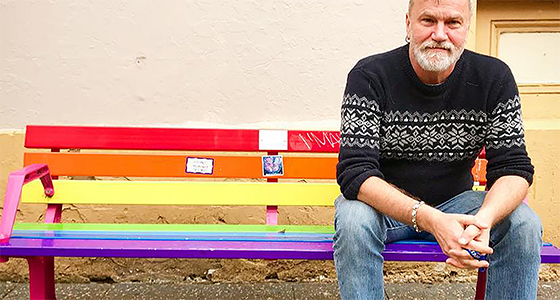Community is close to Rob Lake’s heart. As the Positive Life NSW CEO between 2007-2011, he’s remained close to the NSW community sector ever since.
Today Rob heads up the Newtown Neighbourhood Centre (NNC) Aged Care programs. NNC has a strong focus on supporting boarding houses residents and homelessness people in general.
“The Neighbourhood Centre is really a front door,” said Rob Lake. “It’s a place where people can drop in, and find services that work for them and their needs. We try to support people who experience hardship in different ways. We do three main things.
“We work with people in boarding houses or who are insecurely housed. We work in community development, supporting Inner West families and residents dealing with disadvantage. And third we provide social support to older people. In addition, we try to support the community of Newtown, through the Newtown Festival, groups and services such as counselling and English language, as well as being an advocate for this community.
“There have been social support groups for seniors from the Greek or Yugoslavian communities for over 30 years at the Centre,” said Rob. “We run a number of social support groups and also offer one to one support to older people living at home. We’re also starting to engage more with social support for other communities, including older people living in boarding houses.”
Despite having a population with 95% employment, Sydney’s inner west has the highest number of boarding houses in Australia. A boarding house is an accommodation option where residents can rent a room quickly. These are usually furnished, with shared kitchen and bathroom facilities, however boarding houses can range dramatically in quality.
“People end up in a boarding house for all sorts of reasons and they live in a boarding house because they have to,” said Rob.
“They either don’t have money for a bond, or they can’t afford a rental property. They’re easy to get into and are affordable. However, it’s also a very unstable option, and basically you’re one step away from being homeless.”
The NNC has run a Boarding House Outreach Service for over 30 years, supporting occupants and working with owners of boarding houses across six Local Government Areas (LGAs) in Sydney. With a diverse inner west population, the NNC outreach team work daily with people facing financial hardship, housing insecurity, people living with a range of disability and health conditions including HIV, and people who are homeless or at risk of homelessness. NNC has always worked to support people living with HIV in boarding houses to access more secure accommodation, in partnership with the range of health and HIV-related programs and services.
Using an outreach model, people can meet up with Neighbourhood Centre staff in a variety of community settings, rather than an office or drop into the NNC. The team operate from a person-centered perspective, to resolve the underlying causes of the individual’s housing insecurity with the aim to move towards secure housing.
In Sydney, homelessness is growing amongst older women,” said Rob, “and this is due to a range of reasons like relationships ending, economic reasons, changes in the job market. Boarding houses are not really very safe for women. Often homeless women might couch-surf or try other things rather than living in a boarding house. Wherever possible, women tend to avoid being homeless on the street due to safety. Safe, secure, long term options for older women are harder to find and boarding houses are often not an answer.”
“Boarding houses are one of the options that people living with HIV have turned to for housing, and this is where we can see negative impacts on health,” said Rob.
“The main problem with boarding house accommodation for people living with HIV, like many other people with health conditions is the lack of privacy. It’s a stressful environment, and bad for people’s health. Insecure housing makes it really hard to keep everything on track. Managing health in these spaces is tricky, especially if you’re juggling medications, money, doctors and managing your health and life.
“A secure place to live is a critical part of life,” he said, “and it’s no different for people living with HIV. Safety, privacy, human rights, are all better in secure housing. Sharing with strangers can make disclosure a risk.”
“As we have known for a long time, all of these things together contribute to getting and maintaining good health, which is the goal for all people living with HIV. NNC is one of the housing and homelessness services that work to help find a way out of insecure housing and into a secure place to live.
“The Neighbourhood Centre is open to everyone. We want people to feel welcome, and we don’t turn people away. Wherever you live we’ll either help or help find a service local to you to get help.
If you’re trying to find somewhere to stay, access housing, Centrelink, NDIS or aged care, navigating the system and understanding the process can be difficult. For many people, the system can be too hard to access. It can be difficult to find your way into these services, which is why people can end up homeless, jobless, isolated or unable to access services.
“People can make contact with the Centre in a range of different ways. Some drop in and have a conversation. Others come through the door and say ‘Can I get some help with…’ We’re open 10am to 1pm, four days a week or you can call us on 02 9564 7333 and we’ll try to help.
The Neighbourhood Centre will be moving from its current premises opposite Newtown Station to the Tom Foster Centre in Darley Street at the end of 2021.
– Positive Life NSW
Published in Talkabout #197 June 2021







